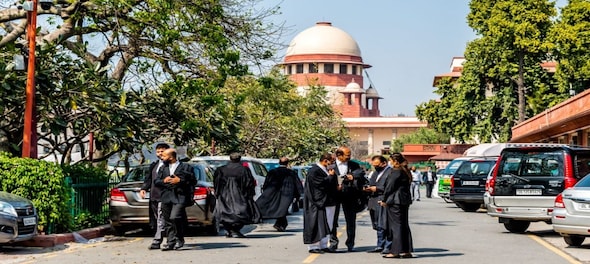
The Supreme Court on March 2 quashed the existing system of appointment of Chief Election Commissioner (CEC) and Election Commissioners(EC), which is being done by the Centre, and ruled that appointment be done by a committee of PM, Leader of Opposition and Chief Justice of India.
The apex court highlighted the need to insulate the functioning of the Election Commission from executive interference, observing that a party in power will have an insatiable quest to remain in power through a servile Commission.
Let's break down what happened...
The Court Verdict
A five-Judge bench of the Supreme Court directed for the formation of an Independent Panel which will advise on appointments of Election Commissioners, including the Chief Election Commissioner. ECI is a three-member body, comprising a CEC and 2 ECs.
As per the apex court, the Panel would comprise:
The Supreme Court wants this practice to be the norm till a specific law is framed.
What The SC Judgment Highlights
CEC and ECs: Current Appointment Process
No specific legislation as of today. The President approves appointments on the advice of the PM-headed Council of Ministers. Article 324 of the Constitution vests the "superintendence, direction and control of elections" in an Election Commission consisting "of the Chief Election Commissioner and such number of other Election Commissioners, if any, as the President may from time to time fix.'"
Supreme Court while delivering the judgment said, 'A party in power will have an insatiable quest to remain in power through a servile Commission.'
What The Petitioners Wanted?
November 24 hearing: SC had questioned 'Speed' Of Arun Goel's appointment
The apex court, during its November 24 hearing had questioned the lightning speed of Arun Goel's appointment as EC. The court asked, "Position vacant since May 15, why was it filled in a tearing hurry?''
The Court added, "We don't have anything against an individual. This man, in fact, is excellent in terms of academics. But we are concerned with the structure of the appointment. On the 18th we hear the case, on the same day you move the file, and on the same day, PM says I recommend his name. Why this urgency?... It says based on the list maintained, there are 4 names that you have recommended. I want to understand that out of a vast reservoir of names, how do you actually select a name?"
Why SC raised a red flag
Former IAS officer Arun Goel who served as Union Heavy Industries Secretary in his earlier tenure sought a VRS 6 weeks prior to his appointment. VRS was approved on November 18 and his appointment as EC came through the following day. Goel took charge as EC on November 21. The Attorney General, who was representing the Government replied, "So that one who is appointed gets at least 6 years as Election Commissioner."
An Election Commissioner can hold office for 6 years or till attaining 65 years of age, whichever is earlier.
How the opposition reacted
Congress spokesperson Randeep Surjewala tweeted in Hindi. He wrote, "The decision given by the Supreme Court is very significant. BJP’s conspiracy to weaken democratic values will never succeed."
भाजपा के लोकतंत्र और संविधान विरोधी चाल, चेहरे और चरित्र को देखते हुए...
देश के मुख्य चुनाव आयुक्त और चुनाव आयुक्तों की नियुक्ति के संदर्भ में,सर्वोच्च न्यायालय का दिया गया ये निर्णय बेहद महत्वपूर्ण है !लोकतांत्रिक मूल्यों को कमजोर करने की भाजपाई साजिश कभी कामयाब नहीं होगी! pic.twitter.com/bnUuHtsgor— Randeep Singh Surjewala (@rssurjewala) March 2, 2023
TMC MP Derek O'Brien tweeted, HUGE, So Extremely Compromised (EC) can again strive to become Extremely Competent (EC) (Reaction to historic Supreme Court direction for appointment of election commissioners)."
HUGE
So Extremely Compromised (EC) can again strive to become Extremely Competent (EC)(Reaction to historic Supreme Court direction for appointment of election commissioners)VIDEOMore on #instagram: https://t.co/xM4kJ9oRAA pic.twitter.com/tevOO13iwX— Derek O'Brien | ডেরেক ও'ব্রায়েন (@derekobrienmp) March 2, 2023
Former CEC SY Quraishi tweeted, "At last SC has clinched it. The demand has been pending for two decades. Good for the perception of neutrality of the Election Commission."
(Edited by : Abhishek Jha)
First Published: Mar 2, 2023 8:49 PM IST
Check out our in-depth Market Coverage, Business News & get real-time Stock Market Updates on CNBC-TV18. Also, Watch our channels CNBC-TV18, CNBC Awaaz and CNBC Bajar Live on-the-go!


Punjab Lok Sabha elections: Check full list of AAP candidates and constituencies
May 18, 2024 12:59 PM
PM Modi, Rahul Gandhi election rallies in Delhi today: Here are the routes to avoid
May 18, 2024 11:28 AM

